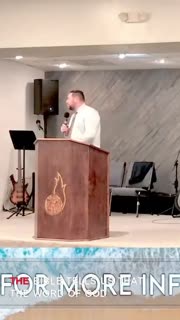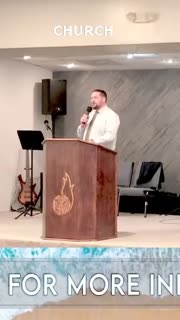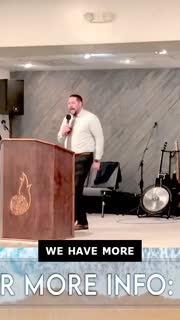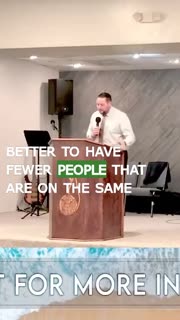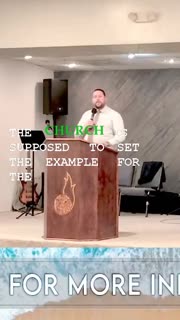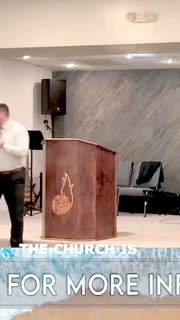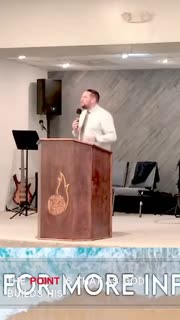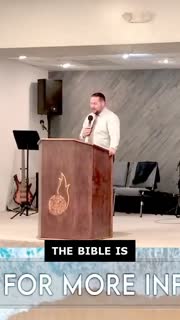Embracing Unity: The Church as One Body
Devotional
Sermon Summary
Bible Study Guide
Sermon Clips
1. "I want to tell you, we serve a miracle working God. And if God can heal a man, listen, you're part of that miracle because this church prayed for that young man. That prayer call went out across the nation and around the world. It was even retweeted by Franklin Graham who tweeted it out from his Twitter account or X account. Millions and millions of Christians heard about his story and he is a living testimony of the power of our God tonight. Can you say amen?" [46:17] (25 seconds)
2. "The Bible tells us that the word of God is eternal. It's powerful. The word of God is able to inspire, to convict, to exhort. The word of God is able to cause us to be fruitful in the kingdom. It's the word of God that became flesh and dwelt among us and Jesus. As we study his word tonight, we are fellowshipping with him. I want to encourage you tonight to dive into this scripture with us." [55:02] (35 seconds)
3. "How many understand that the church requires cooperation? The church is not just a gathering of individuals in a single place. The church thrives as God puts together individual people into his body to do something for his kingdom. How many here enjoy watching or participating in sports? Now there are some sports that are individual sports like golf, for example, but most sports have to do with a team." [55:02] (35 seconds)
4. "We have more reasons to honor and love and work with one another than we do to be divided. Think of this: we have the same Father, we have the same Savior, it's the same blood that has cleansed us all from our sins. We have the same Holy Spirit who dwells within us. We have the same playbook, we have the same purpose, and guess what? Like them or not, the person next to you is going to end up in the same place for all eternity." [58:14] (37 seconds)
5. "It's better to have fewer people that are on the same team than to have many people that are on different teams. Did you hear what I said? It's better to have a few people that are on the same team than to have a crowd of people that are divided. Paul has initiated the three-strike rule: three strikes and you're out. You cause division the first time, we tell you about it. We show you grace, we show you mercy. The second time, we bring a second warning." [01:03:19] (33 seconds)
6. "The church is supposed to set the example for the rest of the world of what heaven is going to look like. You know, in heaven, I don't think we're going to be arguing about stupid things. That should begin now. I close with some images or metaphors that the Bible gives of the church. The Bible says we're a team. Philippians 1, verse 27. Stand fast in one spirit, with one mind, striving together for the faith of the gospel." [01:30:36] (31 seconds)
7. "The church is built, what did he say? Built out of living stones. It's really hard to build out of stones. Because you've got to go down to the creek, pick out a stone that is absolutely unique, one of a kind, and you've got to figure out how to piece those stones together in such a way that they're close, that they're stable, that one's not falling off of the other. You've got to use some cement to put those stones together." [01:34:54] (27 seconds)
8. "The point is that as God builds his church, his spirit lives here. That's what we're after. Because guess what? You can't change people. I can't change people. I can't deliver anybody. And neither can you. But in the temple of the living God where the spirit of God dwells. Listen, this is how God builds his church. This is where God changes lives. This is where God heals marriages. Where God opens up prison doors." [01:37:07] (33 seconds)
9. "The church is a precious and important thing. And you and I, we are called to do all that is in our power to support what God is doing in our local congregation. I understand the kingdom of God is not the same as the church. I understand that. The kingdom of God is much bigger than a single church or even a fellowship, a group of churches. The kingdom of God is the church in general. Everyone who is saved by the blood of Jesus is part of the, capital C, church." [01:19:05] (33 seconds)
10. "The Bible is full of this. Psalm 133, verse 1. How good and pleasant it is for brethren to dwell together in unity. If you're a parent and you have more than one child, do you know what you want from your children? You want peace. You want a house with no contention or strife or fighting or yelling or argument. You people are related to each other. You're brothers, you're sisters, you are always going to be brothers and sisters." [01:20:22] (38 seconds)
Ask a question about this sermon
2. "The Bible tells us that the word of God is eternal. It's powerful. The word of God is able to inspire, to convict, to exhort. The word of God is able to cause us to be fruitful in the kingdom. It's the word of God that became flesh and dwelt among us and Jesus. As we study his word tonight, we are fellowshipping with him. I want to encourage you tonight to dive into this scripture with us." [55:02] (35 seconds)
3. "How many understand that the church requires cooperation? The church is not just a gathering of individuals in a single place. The church thrives as God puts together individual people into his body to do something for his kingdom. How many here enjoy watching or participating in sports? Now there are some sports that are individual sports like golf, for example, but most sports have to do with a team." [55:02] (35 seconds)
4. "We have more reasons to honor and love and work with one another than we do to be divided. Think of this: we have the same Father, we have the same Savior, it's the same blood that has cleansed us all from our sins. We have the same Holy Spirit who dwells within us. We have the same playbook, we have the same purpose, and guess what? Like them or not, the person next to you is going to end up in the same place for all eternity." [58:14] (37 seconds)
5. "It's better to have fewer people that are on the same team than to have many people that are on different teams. Did you hear what I said? It's better to have a few people that are on the same team than to have a crowd of people that are divided. Paul has initiated the three-strike rule: three strikes and you're out. You cause division the first time, we tell you about it. We show you grace, we show you mercy. The second time, we bring a second warning." [01:03:19] (33 seconds)
6. "The church is supposed to set the example for the rest of the world of what heaven is going to look like. You know, in heaven, I don't think we're going to be arguing about stupid things. That should begin now. I close with some images or metaphors that the Bible gives of the church. The Bible says we're a team. Philippians 1, verse 27. Stand fast in one spirit, with one mind, striving together for the faith of the gospel." [01:30:36] (31 seconds)
7. "The church is built, what did he say? Built out of living stones. It's really hard to build out of stones. Because you've got to go down to the creek, pick out a stone that is absolutely unique, one of a kind, and you've got to figure out how to piece those stones together in such a way that they're close, that they're stable, that one's not falling off of the other. You've got to use some cement to put those stones together." [01:34:54] (27 seconds)
8. "The point is that as God builds his church, his spirit lives here. That's what we're after. Because guess what? You can't change people. I can't change people. I can't deliver anybody. And neither can you. But in the temple of the living God where the spirit of God dwells. Listen, this is how God builds his church. This is where God changes lives. This is where God heals marriages. Where God opens up prison doors." [01:37:07] (33 seconds)
9. "The church is a precious and important thing. And you and I, we are called to do all that is in our power to support what God is doing in our local congregation. I understand the kingdom of God is not the same as the church. I understand that. The kingdom of God is much bigger than a single church or even a fellowship, a group of churches. The kingdom of God is the church in general. Everyone who is saved by the blood of Jesus is part of the, capital C, church." [01:19:05] (33 seconds)
10. "The Bible is full of this. Psalm 133, verse 1. How good and pleasant it is for brethren to dwell together in unity. If you're a parent and you have more than one child, do you know what you want from your children? You want peace. You want a house with no contention or strife or fighting or yelling or argument. You people are related to each other. You're brothers, you're sisters, you are always going to be brothers and sisters." [01:20:22] (38 seconds)

